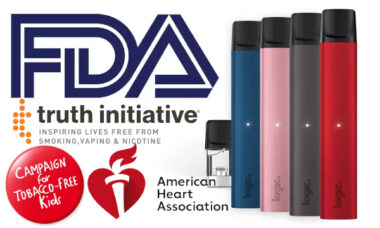 The US Food and Drug Administration (FDA)’s denial of premarket tobacco product applications (PMTAs) for a number of Logic menthol e-cigarette products – the first such products to receive a marketing decision based on what the agency called “a full scientific review” – has been welcomed by public health organisations as “a step forward”.
The US Food and Drug Administration (FDA)’s denial of premarket tobacco product applications (PMTAs) for a number of Logic menthol e-cigarette products – the first such products to receive a marketing decision based on what the agency called “a full scientific review” – has been welcomed by public health organisations as “a step forward”.
Several organisations said it was time the authorities recognised that menthol was a flavour that was still attractive to young people and acted accordingly. However, some industry insiders unsurprisingly expressed concerns about what the decision might mean for the future of the US vaping industry.
“The FDA announcement includes a strong and clear statement that menthol is a flavour that is widely used by kids and plays a major role in the ongoing crisis of youth e-cigarette use,” said Matthew Myers, president of the Campaign for Tobacco-Free Kids. “We hope this decision represents the beginning of accelerated action by the FDA to complete its review of e-cigarette marketing applications.
“To protect our nation’s kids and truly end the youth e-cigarette epidemic, the FDA must complete its review…without further delay and clear the market of all flavoured e-cigarettes, including all menthol-flavoured products.”
The American Heart Association said the decision underscored the need for the FDA to move forward with final rules to remove menthol cigarettes and flavoured cigars from the market since those flavoured products too were “highly appealing to kids”.
‘An important and decisive move’
“As the FDA stated, its evaluation of all new tobacco products is based on a public health standard that balances the risks and benefits of a tobacco product to the population as a whole,” the association added. “With data clearly showing that menthol and other flavoured e-cigarettes appeal to youth, the FDA concluded that any potential benefits of Logic’s products to adult smokers do not outweigh the risks to youth.”
Robin Koval, CEO and president of the anti-tobacco, anti-vape Truth Initiative, said the denial of the Logic application was a “critical step in the right direction to protect the nation’s youth”.
She added: “This important and decisive move under the FDA Center for Tobacco Products (CTP) director Dr Brian King’s leadership underscores the significant health risk that all flavoured e-cigarettes – including menthol – present for youth and young adults about appealing, uptake, and use.”
Meanwhile, the American Association for Cancer Research and the American Society of Clinical Oncology have called for a ban on all flavoured e-cigarette and vaping products.
In a policy statement published in the medical journals Clinical Cancer Research and Journal of Clinical Oncology, the organisations highlighted what they saw as the need for “urgent action to end predatory practices of the tobacco industry and protect public health”. They said long-term health risks would remain unknown until more studies are completed.
Industry takes a dissenting view
However, Charles Gardner, executive director of the International Network of Nicotine Consumer Organisations (INNCO), was sceptical about policy justifications for limiting menthol, tweeting that the FDA was “prohibiting nicotine vape products that almost no teens use”.
Gardner referred to recent data from the National Youth Tobacco Survey (NYTS) about the use of e-cigarettes among middle and high school students in the US in 2022, which found that around 9.4% of all students used such products once a month, and 8% used “flavoured” products. However, of those only one in four “flavour” vapers used menthol – meaning it represented no more than 2% of all students.
Meanwhile Gregory Conley, president of the American Vaping Association (AVA) said the denial was not the significant step in enforcement that the FDA was portraying it as.
He tweeted: “FDA created a narrative about this being a historic step when (as far as I can remember) Blu and Juul both had menthol flavors denied. I guess ‘First time we banned a menthol vape without also banning tobacco flavors’ wouldn’t have been a great hook.”
The federal agency said the Logic Pro Menthol e-Liquid Package and Logic Power Menthol e-Liquid Package were the first menthol e-cigarette products to receive a marketing decision based on a full scientific review.
Some previous menthol vaping products from various companies had been placed on hold while their tobacco and other flavoured counterparts were either respectively approved or denied, while others have been denied as part of wholesale marketing denial orders issued against all of various companies’ products.
– Antonia Di Lorenzo ECigIntelligence staff






